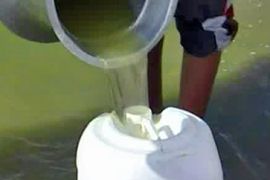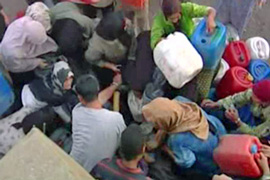Egypt faces water crisis
Hundreds of thousands have to drink water that is polluted.

 |
| Some Egyptians have to walk many kilometres to get clean water |
A large puddle provides the only drinking water for many residents of Brulus on the Nile Delta. The water is putrid.
Anger and desperation brought residents to the streets, blocking the local highway in protest at what they say is the Egyptian government’s indifference to the crisis.
Keep reading
list of 4 itemsTurtles swimming to extinction in Malaysia as male hatchlings feel heat
Could shipping containers be the answer to Ghana’s housing crisis?
Thousands protest against over-tourism in Spain’s Canary Islands
One woman protesting said: “We have to use this water, we have no choice. Dead dogs and donkeys are thrown into this water.
“It’s very dirty yet. We use it for drinking, to wash our clothes and dishes.”
The UN estimates that tens of thousands of people die each year in Egypt from water borne diseases or dehydration.
Failing crops
And it is not just the people who are dying of thirst – so is the land.
| In Video |
|
|
Farms are not producing enough crops. Farmers are falling into debt waiting through another meagre harvest.
One farmer said: “We can’t sleep at night we’re so thirsty. We have no one to go to except maybe to God for help.”
More than 100,000 people in the area are facing sickness or death from the water shortage.
Hadeen Sabbahi, opposition member of parliament for Brulus and Hmoul, said: “There is a hidden and ignored thirst problem in Egypt. The protests here brought light to the problem.
“How can a country that has the Nile river suffer like this? A glass of clean water is a basic right of all citizens.”
Bureaucracy
 |
| More than 10,000 people in the area face sickness or death due to the shortage |
Government opposition parties say bureaucratic red tape is delaying the building of a purified water network in the area, with priority being given to more affluent and tourist-drawing areas.
People must often walk many kilometres to get cleaner water, or in some cases they end up fighting each other for what little water they get here.
“I will steal to feed my children,” one man said. “We work to pay for water. Soon we will even have to buy air from the government.”
As people grow more desperate, so does anger at the authorities’ negligence.
The hope now is for water to flow or for the government to start running.
